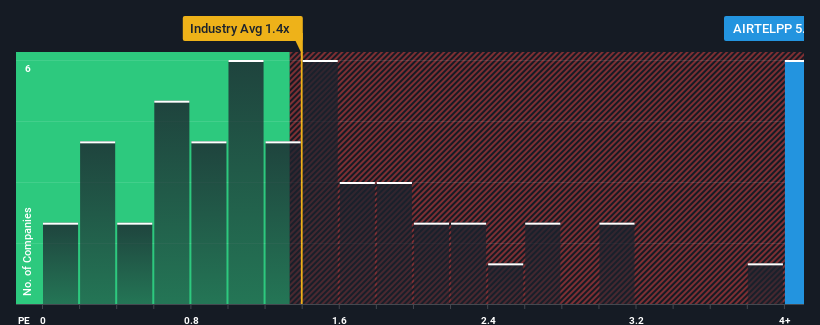- India
- /
- Wireless Telecom
- /
- NSEI:AIRTELPP
Shareholders Should Be Pleased With Bharti Airtel Limited's (NSE:AIRTELPP) Price

Bharti Airtel Limited's (NSE:AIRTELPP) price-to-sales (or "P/S") ratio of 5x may look like a poor investment opportunity when you consider close to half the companies in the Wireless Telecom industry in India have P/S ratios below 1.4x. Nonetheless, we'd need to dig a little deeper to determine if there is a rational basis for the highly elevated P/S.
See our latest analysis for Bharti Airtel

How Has Bharti Airtel Performed Recently?
With revenue growth that's superior to most other companies of late, Bharti Airtel has been doing relatively well. It seems the market expects this form will continue into the future, hence the elevated P/S ratio. You'd really hope so, otherwise you're paying a pretty hefty price for no particular reason.
Want the full picture on analyst estimates for the company? Then our free report on Bharti Airtel will help you uncover what's on the horizon.What Are Revenue Growth Metrics Telling Us About The High P/S?
In order to justify its P/S ratio, Bharti Airtel would need to produce outstanding growth that's well in excess of the industry.
Retrospectively, the last year delivered a decent 10% gain to the company's revenues. The latest three year period has also seen an excellent 49% overall rise in revenue, aided somewhat by its short-term performance. Therefore, it's fair to say the revenue growth recently has been superb for the company.
Turning to the outlook, the next three years should generate growth of 11% per year as estimated by the analysts watching the company. That's shaping up to be materially higher than the 5.9% per year growth forecast for the broader industry.
With this information, we can see why Bharti Airtel is trading at such a high P/S compared to the industry. Apparently shareholders aren't keen to offload something that is potentially eyeing a more prosperous future.
What We Can Learn From Bharti Airtel's P/S?
Typically, we'd caution against reading too much into price-to-sales ratios when settling on investment decisions, though it can reveal plenty about what other market participants think about the company.
Our look into Bharti Airtel shows that its P/S ratio remains high on the merit of its strong future revenues. At this stage investors feel the potential for a deterioration in revenues is quite remote, justifying the elevated P/S ratio. Unless the analysts have really missed the mark, these strong revenue forecasts should keep the share price buoyant.
And what about other risks? Every company has them, and we've spotted 3 warning signs for Bharti Airtel (of which 1 doesn't sit too well with us!) you should know about.
If companies with solid past earnings growth is up your alley, you may wish to see this free collection of other companies with strong earnings growth and low P/E ratios.
If you're looking to trade Bharti Airtel, open an account with the lowest-cost platform trusted by professionals, Interactive Brokers.
With clients in over 200 countries and territories, and access to 160 markets, IBKR lets you trade stocks, options, futures, forex, bonds and funds from a single integrated account.
Enjoy no hidden fees, no account minimums, and FX conversion rates as low as 0.03%, far better than what most brokers offer.
Sponsored ContentValuation is complex, but we're here to simplify it.
Discover if Bharti Airtel might be undervalued or overvalued with our detailed analysis, featuring fair value estimates, potential risks, dividends, insider trades, and its financial condition.
Access Free AnalysisHave feedback on this article? Concerned about the content? Get in touch with us directly. Alternatively, email editorial-team (at) simplywallst.com.
This article by Simply Wall St is general in nature. We provide commentary based on historical data and analyst forecasts only using an unbiased methodology and our articles are not intended to be financial advice. It does not constitute a recommendation to buy or sell any stock, and does not take account of your objectives, or your financial situation. We aim to bring you long-term focused analysis driven by fundamental data. Note that our analysis may not factor in the latest price-sensitive company announcements or qualitative material. Simply Wall St has no position in any stocks mentioned.
About NSEI:AIRTELPP
Bharti Airtel
Operates as a telecommunications company in India and internationally.
Solid track record with reasonable growth potential and pays a dividend.


